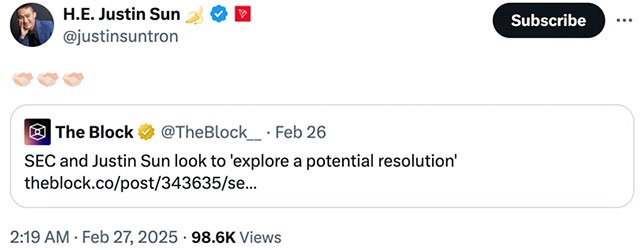This story was originally published on Judd Legum’s Substack, Popular Information, to which you can subscribe here.
In December, Popular Information reported that Chinese crypto entrepreneur Justin Sun purchased $30 million in crypto tokens from World Liberty Financial (WLF), a new venture backed by President Donald Trump and his family. Sun’s purchase resulted in a cash windfall for Trump. On Wednesday, the Securities and Exchange Commission (SEC) and Sun sent a joint letter to a federal judge, asking for a stay of Sun’s case. Today, the judge granted the SEC’s request.
In March 2023, the SEC charged Sun and three of his companies, accusing him of marketing unregistered securities and “fraudulently manipulating the secondary market” for a crypto token. The SEC accused Sun of wash trading, which involves buying and selling a token quickly to fraudulently manufacture artificial interest. Sun was also charged with paying celebrities, including Lindsay Lohan, Jake Paul, and Soulja Boy, for endorsing his crypto “without disclosing their compensation,” which violates federal law.
A few weeks after Trump won the 2024 presidential election, Sun publicly announced that he had become WLF’s largest investor, buying $30 million of its tokens. Sun added that his company, TRON, was “committed to making America great again.”
Copyright
© Mother Jones



